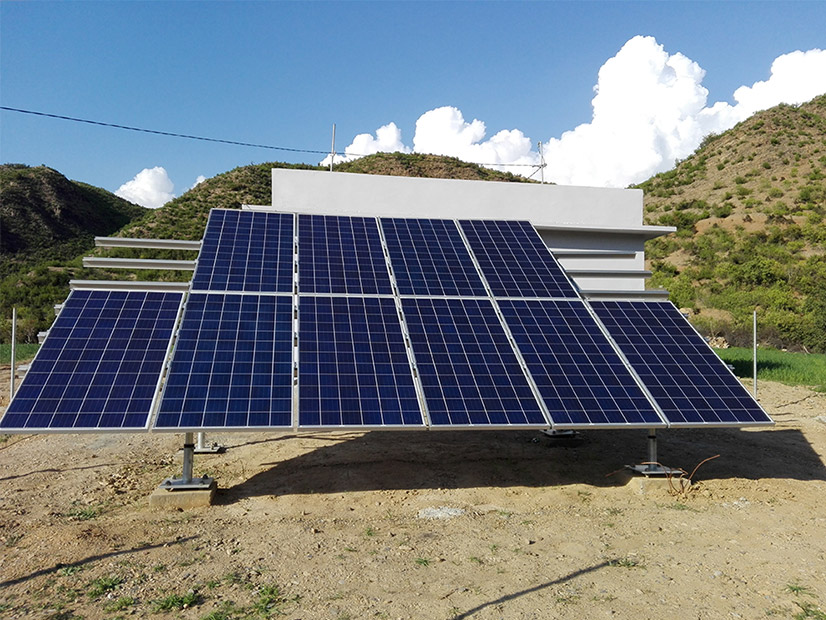When Hurricane Florence made landfall on the North Carolina coast in 2018, it dumped a record 30 inches of rain across the state in a matter of days. Massive flooding overwhelmed roads and buildings. Wind gusts of over 100 mph toppled trees and power lines. Roughly a million customers lost power, in some cases, for weeks. Damages from the storm totaled close to $17 billion.
With another active Atlantic hurricane season on the horizon, three Democratic state senators have introduced a new bill aimed at pouring $4 million into community microgrids and other local resilience projects over the next two years.
By “increasing the technical capacity of our local governments in giving them some initial dollars, hopefully this can make way for more microgrid projects and clean energy projects that are directly looking to address resiliency,” said Sen. Deandrea Salvador, one of the bill’s sponsors.
Sponsored by Salvador and Sens. Natalie Murdock and Mike Woodard, the Energy Resilient Communities Act would provide grants to local governments to deploy clean energy projects. The money could be used to develop climate mitigation infrastructure, conduct stakeholder engagement or build clean energy microgrids that power critical services, among other projects. Ensuring equity is a focus throughout the bill, both in terms of which communities receive and benefit from the grants.
Newly elected to the Senate, Salvador previously led a clean energy nonprofit, the Renewable Energy Transition Initiative, where she saw firsthand the critical needs of families paying a high proportion of their incomes on energy.
“A power shutoff can turn a precarious situation and make it truly much, much worse. It’s a safety concern on a number of different levels,” she said.
Additional equity concerns arise for communities recovering from an extreme weather event. “Some of the communities that are the first to lose electric service, maybe because of geography, can be the last to receive it back,” Salvador said.
Murdock concurred, saying in an email that climate change creates additional “pressure on our ability to keep our communities going with heat, water and power.”
The bill is currently in the Rules and Operations Committee of the Senate, where it will be assigned to a relevant subcommittee for review. It would need to make it through the subcommittees and pass a debate on the Senate floor before the crossover filing deadline on May 13 for it to move forward.
Microgrids as Community Energy Lifelines
Following the widespread power outages in Texas after severe winter storms, resilience was at the forefront of the three sponsors’ minds. The state’s 2020 Climate Risk Assessment and Resilience Plan projects a range of ongoing impacts North Carolina will likely face as climate change escalates over the century, including stronger storms, hotter temperatures and increased rainfall. The plan lists microgrids as one of its recommended resilience strategies, especially where needed to support critical community services.
Microgrids seemed “a natural place to start,” in this bill, Salvador said, pointing to the successful installation and operation of the microgrids managed by the North Carolina Electric Cooperatives (NCEC), whose work has been outpacing the microgrid efforts of the state’s investor-owned utilities. One of the cooperative’s projects is on Ocracoke Island in the Outer Banks, which at 9 square miles and 5 feet above sea level, is extremely vulnerable to hurricanes.
That microgrid has been used to provide emergency power to the island, and it can also help restore electricity faster than if residents were only connected to the main grid. NCEC has also developed advanced microgrid technology that can link microgrids together on a network that supports grid stability by moving power to where it’s needed most. (See NC Microgrids Improving Grid Reliability and Resilience).
In Salvador’s view, microgrids “can have a real, meaningful impact from day one but also helpfully support the governor’s clean energy goals as well.”
In his clean energy plan issued in 2019, Democratic Gov. Roy Cooper set a target for North Carolina’s utility sector to reduce carbon emissions 70% by 2030 and to reach net zero by 2050.
The Resilient Communities bill was modeled on House Resolution 448, which was re-introduced in the U.S. House of Representatives on Jan. 25, after failing to be passed in 2020. Murdock brought Salvador the bill, and they worked to adapt it for the North Carolina context, Salvador said.
While Republicans hold majorities in both the state Senate and House of Representatives, thus far, Salvador said she has heard no opposition to the bill — the legislature has a history of bipartisan consensus-building on energy issues.
The bill also has support from energy groups, such as the North Carolina Sustainable Energy Association (NCSEA).
“Identifying high risk and critical infrastructure and making plans to protect and harden is one step to mitigate risks to the system and residents,” NCSEA Executive Director Ward Lenz said.
“This legislation provides the opportunity to identify potential ways to incorporate clean and distributed energy resources into organizations’ energy management plans that meet energy resilience, sustainability, affordability and efficiency goals,” Murdock said. “This is also a jobs bill. These efforts will generate sustainable jobs and resources for all.”





